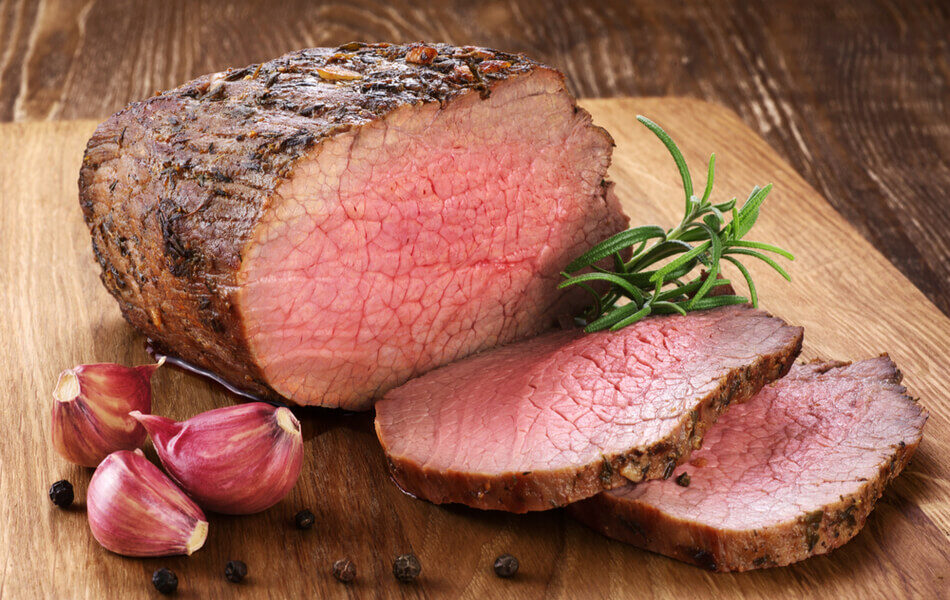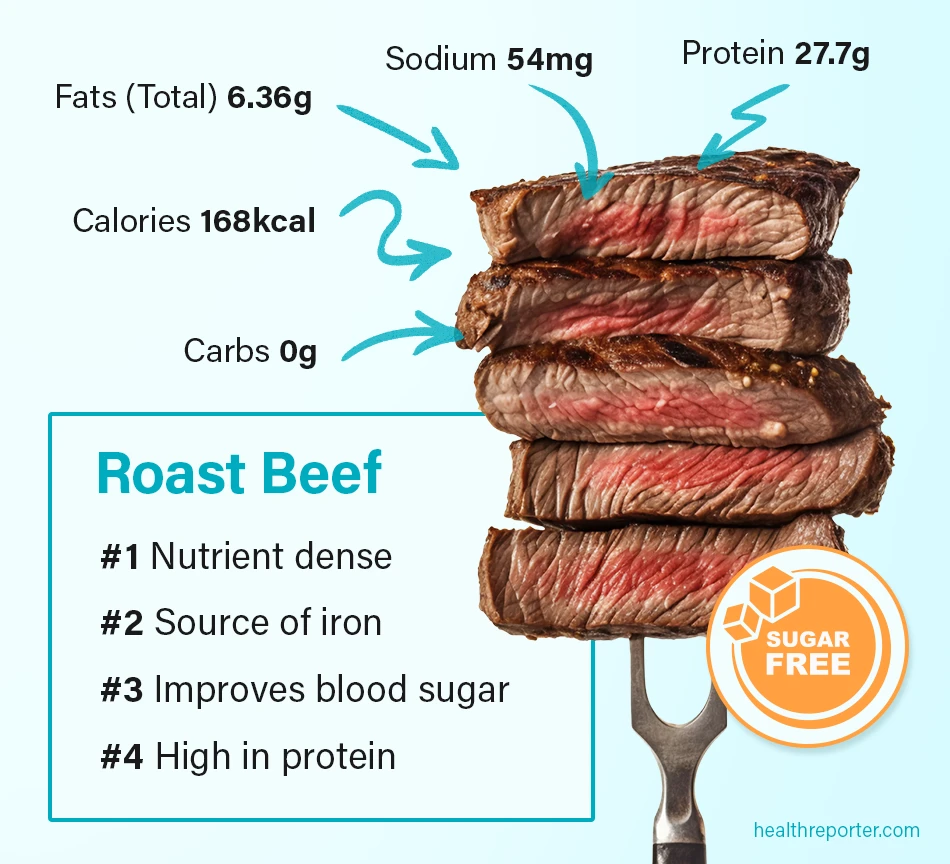Is Roast Beef Healthy? Taste, Nutrition, and Your Health
Health check: our team is decoding the benefits and considerations of roast beef.

It’s hard to say no to roast beef. Just imagining perfectly cooked meat combined with delicious gravy can make anyone’s mouth water.
However, if you’re trying to eat healthier, it’s understandable how you might think this traditional dish isn’t exactly considered nutritious. After all, something this delicious can’t be good for you, right?
Is Roast Beef Healthy?
Yes, roast beef is a healthy choice. It can be considered a complete meal because it is a good source of protein and is often paired with a nutritious veggie side dish. Protein is an energy-providing nutrient that is necessary for building new cells and tissues.
Roast beef is also keto-friendly since it doesn’t contain any net carbs and has a moderate amount of fat.
When it comes to gravy, homemade is best. You can follow the recommendations of the British Heart Foundation and choose low-salt stock cubes or gravy mixes. You can also skip the butter and cook with olive oil with flavorful herbs instead.
Sunday roasts are not complete without side dishes such as cauliflower mac and cheese, mushrooms, and mixed vegetables. Cauliflower is a great alternative to the typical mashed potatoes since it only has 7 calories per ounce serving.
Skipping the salt and cooking with herbs such as rosemary, thyme, and coriander can elevate your side dishes as well.
Consuming beef can also prevent a condition called Iron Deficiency Anemia (IDA). Anemia is a condition where the body’s red blood cells are not able to carry a sufficient amount of oxygen around the body.
IDA is the most common type of anemia characterized by weakness and fatigue. It stems from a lack of iron, which is needed by the body to efficiently circulate oxygen.
Meat is a great source of bioavailable iron and is also thought to improve iron absorption from non-meat sources.

Is Roast Beef Good for Weight Loss?
Incorporating roast beef into a balanced and calorie-controlled diet can help you lose weight. Several of its qualities can help you lose weight. It’s rich in protein and provides essential nutrients like B vitamins, zinc, and iron.
A common misconception about roast beef is that it is unhealthy just because it is made up of meat. But the truth is, it really depends on the type of meat you use.
A serving of roast beef contains only 2.47g of saturated fats, which is well below the daily recommended limit of 13g. It is also a good protein source, essential for weight control.
Processed beef may contain nitrates, a common preservative used in deli meats. Ideally, it is better to get your beef fresh from your local butcher. Fresh meat also contains less amount of sodium than deli meat.
What Are the Benefits of Roasted Beef?
Among savory delights, roast beef stands out for providing more than just delectable flavors. Besides its mouthwatering taste, roast beef also offers a variety of nutritional benefits.
#1 Good source of protein
Roasted beef is an excellent source of protein. In addition to building and repairing tissues, protein is important for supporting muscle growth and maintaining overall body functions. Adding roasted beef to your diet can help you meet your daily protein requirements.
Roast beef provides 27.7g of protein per serving and can help achieve the recommended daily allowance of 56g for men and 46g for women.
A single 3oz serving of sirloin can take care of your protein needs for the entire day.
#2 Time-saver
The meat and the vegetables can be roasted in the same tray. This can come in handy if you’re cooking more than one dish for that Sunday feast.
A roast beef leftover can be transformed into a stew, soup, or casserole. In these recipes, you can repurpose roast beef into hearty meals without starting from scratch because they require less active preparation time.
#3 Nutrient dense
Roast beef provides a good mix of protein, fat, and carbohydrates. The use of flavorful herbs and vegetables makes it a delight to the palate as well.
Many essential nutrients are found in roasted beef, including iron, zinc, vitamin B12, and other B vitamins. While iron plays a crucial role in oxygen transport throughout the body, zinc helps the immune system and promotes wound healing. The vitamin B12 contributes to the formation of red blood cells and nerve health.
This meat is also low in saturated fat, which is proven to contribute to high cholesterol. Therefore, you can eat roast beef without worrying about your heart health.
Roast Beef Nutrition Facts
Roast beef is not all protein – it is also a good source of vitamins and minerals. Here’s a breakdown of what’s in store for every serving of this delicious meal:
Nutritional value (per 100g)
| Calories/Nutrient | Amount |
| Calories (kcal) | 168 |
| Fats (Total) (g) | 6.36 |
| Carbohydrates (g) | 0 |
| Protein (g) | 27.7 |
| Cholesterol (mg) | 85 |
| Iron (mg) | 3.04 |
| Potassium (mg) | 352 |
| Sodium (mg) | 54 |
| Vitamin B6 (mg) | 0.67 |
| Vitamin B12 (µg) | 4.21 |
Source: https://fdc.nal.usda.gov/fdc-app.html#/food-details/746758/nutrients
High in vitamins and minerals
Roast beef contains a good amount of iron, a mineral that is an essential component of hemoglobin. Hemoglobin is a type of protein found in red blood cells that assists in carrying oxygenated blood around the body.
Beef also contains niacin. Also called B3, niacin is known to increase the levels of good cholesterol and lower triglyceride levels. Niacin is often prescribed in conjunction with cholesterol-lowering medications because of its potent bad cholesterol-lowering effects.
Consuming beef on a regular basis can also help boost your immune system. Typically, this is a job for white blood cells, but minerals present in red meat such as zinc and selenium can also help the body fight off infections.
High in protein
Roast beef is considered a high-quality protein because it contains 27.7g per 100g serving. Also, it has all the essential amino acids necessary for body maintenance and growth.
Protein is especially important for people who are recovering from trauma, surgery, or intense sporting events. Consuming animal-based protein helps the body build new tissues and maintain muscle mass.
Contrary to popular belief, muscle mass isn’t only for bodybuilders or athletes. It is also an important factor in daily activities such as walking, climbing stairs, or driving. Regular exercise with strength training can also help improve muscle mass.
Low in fats and calories
Roast beef contains a total of 6.36g of fat per 100g serving. The daily recommended fat intake would be around 44g to 77g of fat. While the dish is well below the daily limit, it is important to note that beef should always be consumed in moderation.
Consuming roast beef means consuming saturated fat. The American Heart Association defines saturated fat as the type of fat that is solid at room temperature.
Although roast beef is relatively low in saturated fat – only about 2.47g per serving – it does have a potentiating effect if you are already having problems with your cholesterol.
Instead of choosing sliced deli meats, you can opt to lean-cut meats such as round roast or enjoy a sandwich made up of roast beef cold cuts instead.
Beef does not contain any carbohydrates. However, roast beef isn’t enjoyed without side dishes – mashed potatoes, mac and cheese, and pasta usually accompany roast beef. In order to keep things healthy, always choose healthier alternatives.
High in cholesterol
Cholesterol always gets a bad rep, but the truth is – we need it to survive. Your liver produces cholesterol needed by the body to produce cell membranes, hormones, and vitamin D.
Aside from the liver, you can also get cholesterol from the food you eat. Poultry, deli meat, goat meat, dairy, and meat all contain a good amount of cholesterol. The problem begins when you consume too much of these foods enough to raise your blood cholesterol levels.
Conjugated linoleic acid, or CLA, is a type of trans fat that is found in beef and dairy. Studies have shown that CLA reduces the amount of fat deposited in the body. It has also been thought to help control blood pressure in some cases.
Choosing the right type of meat and side dishes is key to enjoying a great dish like roast beef without the consequences. You can also opt to swap beef with chicken breast or other forms of white meat.
FAQ
Beef can lose some nutrients during roasting, but it still contains vitamins and minerals such as B12, zinc, and iron. Its overall healthiness can be impacted by the method of cooking and the added ingredients.
The fattening potential of roast beef varies with the cut, cooking method, and portion size. By using lean cuts, grilling or roasting it properly, and trimming visible fat, its fat content can be reduced.A larger portion, regardless of the cut, can result in a higher calorie intake.
Roast beef is an excellent source of protein. Additionally, it contains amino acids that play an important role in the body. In addition to repairing tissues, protein supports muscle growth, maintains a healthy immune system, and promotes overall well-being.
Generally speaking, this meat is not high in fat. However, depending on the cut and preparation of roast beef, its fat content may vary. Choosing leaner cuts and cooking methods will help you manage your fat intake when you eat roast beef.
It is generally considered that roast beef is a lean meat option. Leaner cuts of meat can provide a good source of protein without contributing excessive amounts of saturated fat.
A Word From a Dietitian
Roast beef is a satiating dish, especially when served with side dishes. The protein component will fill you up quickly, making you feel full for the rest of the day.
While the thought of never having to eat another meal may be exciting, it may not always be the best choice. No matter what type of meat you use, roast beef is still mainly made up of red meat with saturated fat.
When shopping for the right type of meat, choose those graded as “choice” or “select.” It’s easy to be attracted to beef labeled as “prime,” but these usually have more fat than you need.
According to the University of Oxford, consuming more than 50g of unprocessed red meat per day increases your risk of developing heart disease by 9%. If you prefer to use deli meat (i.e., processed meat), that risk goes up to 18%.
Eating roast beef should always be done in moderation. A varied diet and a regular exercise routine should also be incorporated into your lifestyle.
Conclusion
Whenever roast beef is served, a celebration is always warranted. It’s no surprise since it is a traditional dish that is both healthy and a delight to the palate. It is a good source of protein – a nutrient that is essential to everyday life.
Whether you’re looking to lose a few pounds or celebrate the next milestone, roast beef is certainly a dish to enjoy.

















































 Select your language:
Select your language: 








